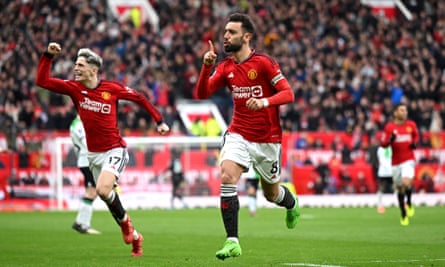Everybody’s done it. The door looks heavy or stiff, so you give it an almighty shove, only to find the expected resistance isn’t there so you tumble through, falling flat on your face. Erik ten Hag’s genius has been to take an everyday pratfall and turn it into a philosophy.
On Sunday Liverpool, astonishingly, fell victim to the trick for the second time in three weeks. The first time put them out of the Cup; this second, although a draw rather than a defeat, cost them leadership of the league.
It made very little sense, but then football sometimes doesn’t. The Manchester United equaliser was the perfect encapsulation of that: Bruno Fernandes 45 yards out, clipping his finish over Caoimhín Kelleher with United’s first shot of the game, five minutes after half-time. Liverpool had 17 chances before that, and yet the score was 1-1.
Ten Hag had said after last week’s draw against Brentford, an equally one-sided game, that he wasn’t bothered how many shots his side conceded so long as they get results. For a coach so focused on the process it was a remarkable statement. Lay people may think there is some correlation between how many shots a team has and how many goals they score, but Ten Hag is way beyond that. Liverpool had 87 shots in three games against United this season and didn’t win any of them.
Since systematisation took hold in the mid-60s, football has always been about space, but the orthodoxy has always been that it was about creating it for yourself and denying it to the opposition. But Ten Hag has disrupted all that. He’s through the looking-glass. What, he’s asked, if you give the opposition space? Elite-level players are used to being put under pressure, they’re used to being closed down, they’re used to opponents pressing. Space alarms them. It makes them uneasy. It makes them think too much.
Amid the cavernous vaults of United’s midfield, their fears and doubts echo unnervingly. And so they miss. They can’t handle it when it’s too easy for them. Forget positionism, relationism, counter-pressing and the rest: this is the future. Ten Hag has invented inverted pressing.
It’s not just Liverpool who have found United’s weird openness hard to deal with. In the past 14 games, United have conceded 308 shots. That’s 22 per game, and yet United have lost only three of those matches. A rough rule of thumb over football history is that nine shots equal a goal: United in effect are giving away almost 2.5 goals per game, and yet in those 14 games they’re leaking an average of just 1.71.

All reason, all precedent says it should catch up with them eventually – and perhaps to an extent it did in the two goals conceded in injury-time in Thursday’s 4-3 defeat to Chelsea – but, still, André Onana’s goal leads a charmed life.
And at the same time, United have players capable of moments of brilliance at the other end of the pitch. Fernandes is a frustrating mix of petulance and penetration, but he took his chance superbly. Kobbie Mainoo’s goal was the result of him finding space, moving the ball on to Alejandro Garnacho, and then continuing his run to find space again in the box before a stunning finish. But, of course, he is used to playing against inverted pressing in training; space doesn’t faze him in the same way.
In Mainoo, Garnacho and Rasmus Højlund there are clear reasons for United to be optimistic. At least some of the personnel are there. But realistically, the lack of coherence, the gaping holes between the lines, the ongoing sense of shambles towards the end of Ten Hag’s second season in the job is unsustainable. The referee Anthony Taylor made as many interceptions in the game (two) as United’s central midfield trio between them.
But this is not just about United, neither about their good fortune nor the resilience with which they have to be credited as they keep on taking beatings and clambering off the ropes to land vital punches.
after newsletter promotion
It’s also about Liverpool and their failure to take chances in key games. As Jürgen Klopp noted, they should have had this game won by half-time. They should also, clearly, have beaten United at Anfield in December, when they had 34 shots but drew 0-0. But they also had spells of dominance in the home games against both Arsenal and Manchester City and ended up drawing both 1-1.
If Liverpool don’t win the league this season, they will point, reasonably enough, to the Luis Díaz goal that was wrongly ruled out at Tottenham. But a lack of precision at key moments against their immediate rivals will also have played a part.
And they do have an occasional tendency to let their intensity drop, or to take time to get into games, which is why they have found themselves having to come from behind so often. The flaws are almost infinitesimal, but in a title race this tight, they could be crucial.
Ten Hag’s United, meanwhile, bound blithely on, reinventing the game, defying convention, laughing in the face of logic.
Source: theguardian.com


















